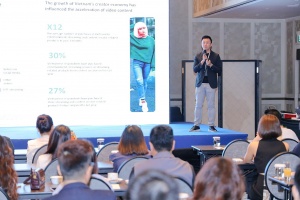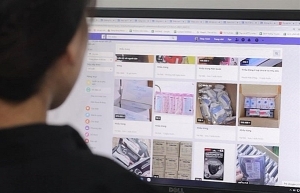Meta discusses latest report on Southeast Asian digital consumers
 |
| Khoi Le, Meta's country director for Vietnam |
Throughout five years of researching, what were the most prominent changes you have observed in consumers' behaviours pre-, during, and post-pandemic?
It is the acceptance of digital tools. Even before COVID-19, Vietnamese people were already quite receptive to the digital space. However, not months but years of the pandemic have turned that into a habit while workers were forced to collaborate remotely and our children had no choice but to study through a screen, even with interactive subjects like language or music.
A part of the report examined whether there was a change in consumer behaviour three months after the economy reopened. In some industries, we saw that consumers returned to offline purchases, including necessities and fresh food. However, five particular industries saw an increase in purchase orders post-COVID, including beauty, personal care, home office, clothing, and alcoholic beverages.
Along with that, the amount for each transaction saw an increase in numerous industries, including household appliances and furnishings, clothing, toys, and packaged groceries. This could be because customers have got comfortable with the purchase method and trust the product's consistency and quality.
From this, what we have to accept is that consumer journeys will become much more unpredictable. As they can now access different sales channels and their online-offline experience grows more diverse, their selection of products and services has become harder for businesses to grasp.
These are two sides of the same coin. On the one hand, businesses will have greater opportunities to reach new customer groups. On the other hand, it is harder for them to keep their existing customer base and create brand loyalty.
According to the report, consumers are looking for more value and engagement, and Vietnamese consumers are at the top in terms of the adoption rate of future technologies. What are the driving forces behind this change?
Vietnamese people are creative and willing to try new things. As a Vietnamese myself, these findings do not surprise me. We tend to be active in using technology to improve life quality and create better experiences. This assessment applies to both consumers and solution providers.
One example would be the wide usage of Meta's AR try-on technology for the clothing and cosmetics industries in Vietnam. I consider this a win-win solution for both brands and consumers. While it offers a platform for brands to showcase their various products, consumers get to try them on one by one and learn about their technical details from the comfort of their homes.
Earlier this month, VIB bank launched its first virtual financial advisor named Vie, powered by AR technology. Besides giving banking consultancy like a traditional bank teller, VIB is showcasing Vie's capabilities through talk shows where Vie gives personal financial advice. This is another example of how businesses are making good use of AR, VR, and the Metaverse to enhance the user experience.
 |
| Post-pandemic consumers demand an integrated experience |
Based on the report, what would you predict to be some emerging trends in the digital commerce industry?
Online shopping will definitely continue to be a trend. The report forecasted that as more and more people participate in the digital economy in terms of both quantity and volume, certain industries will see online growth, from traditional segments such as clothing or cosmetics to emerging industries like fintech, health tech, and edtech.
The second trend would be business messaging (BM). BM is now in its early stage, where businesses are making efforts to grow their customer base and enhance their customer experience. As the method gets refined and progressed, companies will need to learn how to make the best use of each potential lead generated and to form better relationships with consumers.
The third is the use of videos. The report suggests that watching videos is the top online activity for Vietnamese consumers while seeking engagement. While this is not a new concept, content generation and establishing positive relationships with consumers through videos is a new challenge for creative businesses.
And another trend would definitely be the use of future techs like AR, VR, and the Metaverse.
In that context, how do Vietnamese businesses make the best use of the current trends in consumer behaviours?
A consumer journey consists of three stages; discovery, evaluation, and purchase. Businesses need to be active in all stages.
For discovery, businesses now have the opportunity to reach out to customers before customers come to them. Businesses need to take advantage of social media since it creates a fair and open playground for all, regardless of what size they are, instead of traditional ad platforms where bigger companies can gain an upper hand.
In the evaluation stage, it's about forming one-on-one interactions. An effective tool for this is the aforementioned business messaging. Through BM, businesses are encouraged to connect with consumers for their different shopping needs during different stages of their lives and cross-sell when possible.
How does Meta assist Vietnamese businesses in their development paths?
While Meta is not a shopping platform, it offers a wide range of solutions to help businesses sell better, including BM, live streaming, and videos. Videos or reels are now one of the best methods for brand building and recognition. Through working with and assisting content creators, Meta aims to constitute a business development community.
Another project we are working on is called Project Fair Fee, where we help content creators access and build new skills in AR/VR and get certified by Meta. This is an effort to create equal and inclusive access for individuals generating income from the content creation economy.
 | Meta and Bain & Company release report on Southeast Asian digital consumers Meta and Bain & Company have just published important findings on digital consumers in the context of the e-commerce boom across Vietnam and the region. |
 | Meta accompanies Vietnam in its digital transformation The digital economy accounts for more than 8 per cent of the country’s GDP, and tech giants like Meta continue to play a crucial role in the country’s digital acceleration. Rafael Frankel, director for Public Policy for South and Southeast Asia, Meta, talked with VIR’s Linh Le about Meta’s recent talks with the government and the country’s digital development. |
 | 45 million Vietnamese people shop online Nearly 45 million Vietnamese people now access online shopping, a forum on domestic consumption trends on August 20 in Hanoi heard. |
What the stars mean:
★ Poor ★ ★ Promising ★★★ Good ★★★★ Very good ★★★★★ Exceptional
Related Contents
Latest News
More News
- Vietnam forest protection initiative launched (February 07, 2026 | 09:00)
- China buys $1.5bn of Vietnam farm produce in early 2026 (February 06, 2026 | 20:00)
- Vietnam-South Africa strategic partnership boosts business links (February 06, 2026 | 13:28)
- Mondelez Kinh Do renews the spirit of togetherness (February 06, 2026 | 09:35)
- Seafood exports rise in January (February 05, 2026 | 17:31)
- Accelerating digitalisation of air traffic services in Vietnam (February 05, 2026 | 17:30)
- Ekko raises $4.2 million to improve employee retention and financial wellbeing (February 05, 2026 | 17:28)
- Dassault Systèmes and Nvidia to build platform powering virtual twins (February 04, 2026 | 08:00)
- The PAN Group acquires $56 million in after-tax profit in 2025 (February 03, 2026 | 13:06)
- Young entrepreneurs community to accelerate admin reform (February 03, 2026 | 13:04)

 Tag:
Tag:

















 Mobile Version
Mobile Version